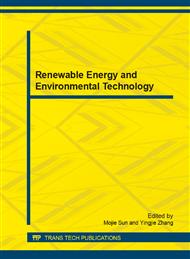[1]
Laurence D.J., Neenan B.F., The status of demand response in New York, Proc. IEEE Power Engineering Society General Meeting, 2003, 2270–2274.
DOI: 10.1109/pes.2003.1270975
Google Scholar
[2]
The Nordpool website: http: /www. nordpool. no.
Google Scholar
[3]
Bunn D.W., Forecasting loads and prices in competitive power markets, Proc. IEEE, 2000, 163–169.
DOI: 10.1109/5.823996
Google Scholar
[4]
Ju Ge, Lizi Zhang, Pareto optimally model of reserve market including interruptible load as participants, Automation of Electric Power Systems, 30(9), 2006, 34-37. (In Chinese).
Google Scholar
[5]
Haiying Li, Yuzeng Li, Shaohua Zhang. Model and algorithm of transmission congest ion management based on interruptible load, Automation of Electric Power Systems, 30(10), 2006, 17-21. (In Chinese).
Google Scholar
[6]
Uturbey W., Simo ˜es Costa, A.J. A, Short term hydrothermal coordination in the presence of price-responsive loads, Proc. IEEE Power Tech Conf., St. Petersburg, 2005, 25-30.
DOI: 10.1109/ptc.2005.4524761
Google Scholar
[7]
Jiekang Wu, Tang Li, Stochastic optimization scheduling method for hydrothermal power systems with stochastic loads, Proceedings of the CSEE, 32(28), 2012 36-43. (In Chinese).
Google Scholar
[8]
Hongyu Wu, Xiaohong Guan, Qiaozhu Zhai, Short-term hydrothermal scheduling using mixed-integer linear programming, Proceedings of the CSEE, 29(28), 2009 36-43. (In Chinese).
Google Scholar
[9]
Franco P.E.C., Carvalho M.F., Soares S. A, Network flow model for short-term hydrothermal scheduling problems, IEEE Trans. Power Syst., 9(2), 1994, 1016-1022.
DOI: 10.1109/59.317642
Google Scholar
[10]
Soares S., Salmazo C.T., Minimum loss predispatch model for hydroelectric power systems, IEEE Trans. Power Syst., 12 (3), 1997, 1220-1228.
DOI: 10.1109/59.630464
Google Scholar
[11]
Orrego N.J., Almeida K.C., Zurn H.H., Short term hydrothermal scheduling under bilateral contracts, Proc. IEEE Power Tech Conf., Porto, Portugal, 2001, 10-13.
DOI: 10.1109/ptc.2001.964615
Google Scholar
[12]
Wei H., Sasaki H., Kubokawa J., Large scale hydrothermal optimal power flow problems based on interior point nonlinear programming, IEEE Trans. Power Syst., 15(1), 2000, 396-403.
DOI: 10.1109/59.852150
Google Scholar
[13]
He Tzer J, An economic dispatch model incorporating wind power, IEEE Trans on Energy Conversi on , 23(2), 2008, 603-611.
Google Scholar
[14]
Soder L, Reserve margin planning in a wind-hydro-thermal power system, IEEE Trans. on Power Systems, 8(2), 1993, 564-571.
DOI: 10.1109/59.260826
Google Scholar
[15]
The ILOG CPLEX, 2008. [EB/OL]. [2012-09-11]. http: /www. ilog. com/products/cplex.
DOI: 10.1287/orms.2007.06.08
Google Scholar


